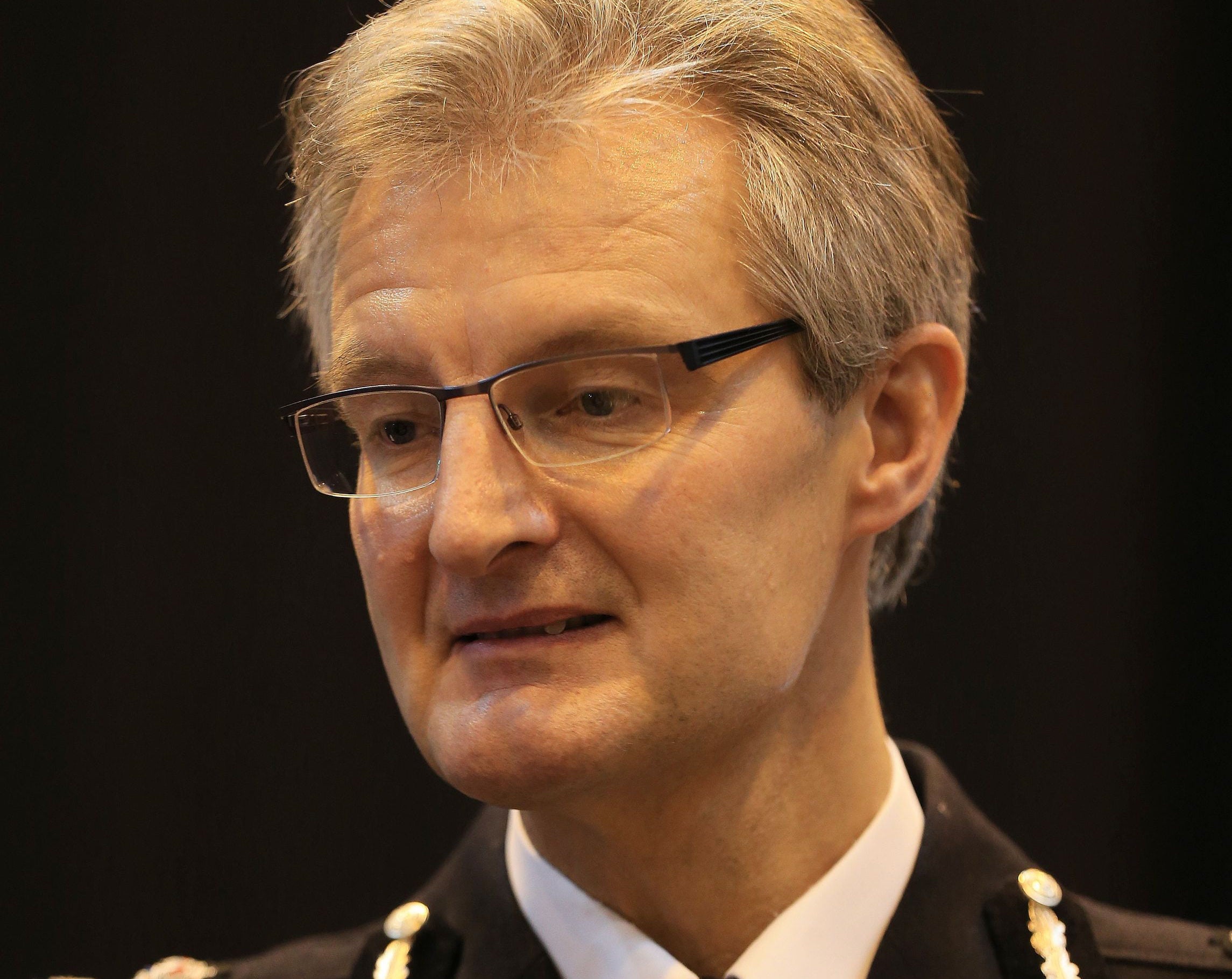
The former chief constable of South Yorkshire Police has said he thought BBC footage of the force’s raid on Sir Cliff Richard’s home was “intrusive” when he watched it while on holiday in Wales.
David Crompton, who was chief constable at the time of the search, said in a witness statement to the High Court that he “became very concerned” because the TV coverage was “something more” than he expected to see.
“I had thought that there may be some limited footage of my officers going into Sir Cliff Richard’s property,” Crompton (pictured) said.
“What I saw was much more extensive and I thought it was intrusive.”
Sir Cliff, 77, is suing the BBC for what he claims was a “very serious invasion” of his privacy when the raid on his home was broadcast in 2014, and is seeking damages “at the top end” of the scale.
The coverage included footage taken from a helicopter flown above the singer’s home, which is on a private estate in Sunningdale, Berkshire.
The BBC is defending the case, arguing that there was a “legitimate public interest” in its coverage.
Crompton said he first became aware South Yorkshire Police would be investigating Sir Cliff in the summer of 2014. He was later told BBC reporter Dan Johnson was aware of the investigation.
“I can remember very clearly thinking that there was a journalist who knew as much as I did about the allegations,” Crompton said.
“This information was deeply concerning to me because I thought that a media report on a high profile case, which was in its infancy, could fatally compromise SYP’s ability to carry out a thorough investigation which, as I have said, was my priority.
“The thought of a journalist reporting on the investigation before SYP had been able to conduct the search was a particular concern.”
He believed the story was “bound to come out” now that the media was aware of it, and thought the BBC was likely to report it “imminently”, he said.
Providing the BBC with information about the search was a “small concession” which he decided was necessary to “protect the integrity” of the investigation.
The investigation was launched after the Metropolitan Police passed on to South Yorkshire Police a claim by a man that, when he was a child in the 1980s, he had been sexually assaulted by Sir Cliff at Sheffield United’s Bramall Lane during a rally led by the Evangelical preacher Billy Graham.
Sir Cliff, who has consistently denied the allegation, was never arrested. After a two-year investigation, prosecutors announced that no charges would be brought and no further action taken.
South Yorkshire Police has already paid £400,000 in damages to the singer.
Crompton told the court yesterday that he did not want publicity for the search but he agreed that the corporation should be told the date and time it would take place to avoid compromising the investigation.
“We were in a difficult position,” he told the High Court.
“I considered it to be of paramount importance that we were able to complete an unhindered and untainted investigation and one might say the relationship with the BBC became a shotgun wedding.”
Crompton denied a proposition put to him by Gavin Millar QC, for the BBC, that the evidence was “quite clear” the police force wanted publicity of its investigation into Sir Cliff.
Those within the force who knew about it had taken care not to refer to the investigation in writing, to avoid any possible leaks, Crompton said.
But, he said, “all that changed” following a conversation between Johnson and the force’s head of communications, Carrie Goodwin, in which the reporter indicated he was aware that Sir Cliff was under investigation.
He said: “This [publicity] was specifically not wanted, however that conversation was a game-changer.
“What I wanted was that we should be able to complete the investigation without it being compromised.
“I didn’t want the television coverage, that was not the ideal, however the situation we were in was that this was, in effect, the price to pay.”
Crompton said he thought the BBC’s use of a helicopter to film above Sir Cliff’s property was “disproportionate”.
He accepted he hadn’t raised any concerns about it being used before the search, but said this was because he didn’t think it was a possibility.
He said: “I could never have imagined in my wildest dreams that the BBC would do what they did. I have never seen coverage like this ever in my police career.”
Crompton said he knew immediately there would be “repercussions” when he saw BBC coverage of the search.
He saw the broadcast while on the beach during a family holiday in Wales – but was “not expecting” to see footage filmed from a helicopter.
“Having looked at the footage, I immediately formed the view there would be repercussions,” he said.
“I was expecting to see officers going in from the street, I wasn’t expecting to see a helicopter, and I felt that would change the perspective of people viewing this and attract criticism – and we would be part of that.”
The allegation against Sir Cliff was “weak” and he had believed from the outset the police investigation was “unlikely” to lead to a charge or prosecution, he went on.
Millar put it to Crompton that South Yorkshire Police wanted publicity of its investigation into a high-profile figure accused of a sexual offence against a child, as it had been heavily criticised over its failings in relation to child sexual exploitation in Rotherham and the coverage would show officers “fearlessly investigating”.
Crompton denied that the force wanted publicity, adding: “I fundamentally disagree.”
The trial has now been adjourned until 8 May, when lawyers will return to court to make their closing submissions in the case.
Picture: Lynne Cameron/PA Wire
Email pged@pressgazette.co.uk to point out mistakes, provide story tips or send in a letter for publication on our "Letters Page" blog







